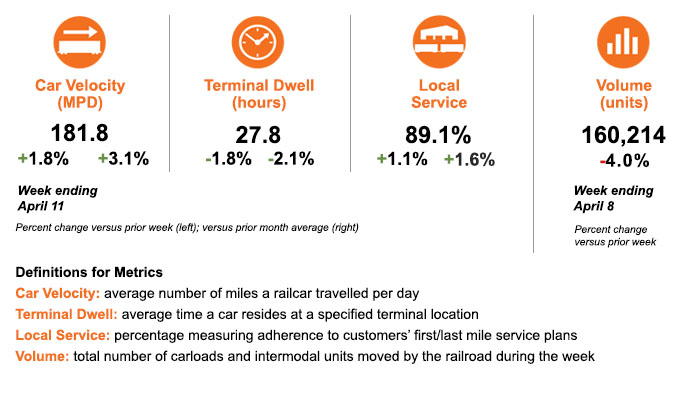Intermodal Network Update for Friday, April 14, 2023
OPERATIONAL PERFORMANCE
BNSF operating teams are generating some improved service performance while continuing to address weather-related challenges across the network, in particular the prolonged impact of the record-breaking weather sustained across much of our North Region. The Twin Cities has had snow on the ground for 111 consecutive days, and Minneapolis-St. Paul airport has logged five straight months of double-digit snowfall for the first time in history, dating back to 1884. Further west, a record 37.4 inches of snow fell over Casper, Wyoming, last week, breaking the city’s all-time two-day record for snowfall. High winds, up to 70 mph, in the Southwest and Midwest also caused some service interruptions on the Southern Transcon, our primary route between Chicago and Los Angeles.
BNSF resources are and will continue to be focused on alleviating the backlogged traffic resulting from these interruptions. To expedite recovery across our network, we have temporarily relocated employees to the most impacted areas, specifically to locations in and around the Twin Cities and across the Southwest. Our mechanical teams are also working overtime to repair locomotives and railcars faster and return them to service. We’ve rerouted some traffic to alleviate switching demands in the Twin Cities area and added railcars to support freight volumes.
Flooding from rapid snow melt caused multiple track washouts this week; one near Foxboro, Wisconsin, approximately 130 miles northeast of Saint Paul, Minnesota, and another near Watertown, about 50 miles west of Saint Paul. Both incidents impacted the main track, but service was restored in less than thirty-six hours as crews worked quickly to repair the affected track as the waters receded.
Regarding metrics, average car velocity improved slightly versus the prior week, up over three percent from the level for March. Terminal dwell is below the average level for the preceding week and month, while local service compliance, which reflects our timeliness in handling carload freight, increased slightly versus the prior week and month.
SERVICE EXPECTATIONS FOR THE WEEK AHEAD
Flood watches and warnings are currently in effect for parts of northern Montana, North Dakota, Minnesota and Wisconsin, as warmer temperatures combined with a surplus of snow have caused water levels to rise; however, cooler temperatures are expected to move into the Upper Midwest over the weekend, with rain and the potential for more snow in the Twin Cities. BNSF operations teams will continue monitoring water levels in flood-prone areas and taking preventative measures to minimize customer impacts.
Most areas of the BNSF network will experience favorable operating conditions during the upcoming week, with no significant weather events expected at this time.
As always, we thank you for your business and appreciate the opportunity to serve as your transportation service provider. We welcome your feedback and questions.